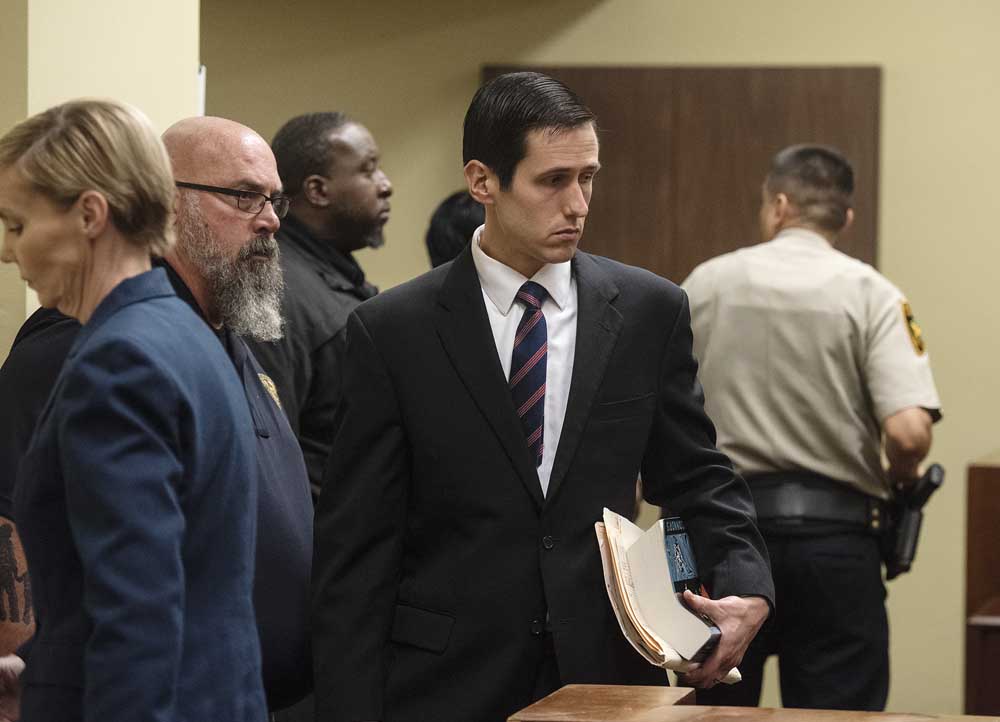UPDATE: Gustavo Zavala-Garcia sentenced to life in prison without parole for killing 10-year-old girl
Published 5:30 pm Thursday, August 22, 2019

- Smith County District Attorney Jacob Putman is pictured during a pre-trial hearing for defendant Gustavo Zavala-Garcia, 27, at right, on Thursday Aug. 22, 2019 in the 241st District Court. Zavala-Garcia, who was accused of killing 10-year-old Kayla Gomez-Orozco in November 2016, entered a guilty plea and was sentenced to life in prison without parole. (Sarah A. Miller/Tyler Morning Telegraph)
The man accused of killing 10-year-old Kayla Gomez-Orozco in November 2016 has been sentenced to life in prison without parole.
Gustavo Zavala-Garcia, 27, pleaded guilty to capital murder under a plea deal reached between his attorneys and Smith County District Attorney Jacob Putman.
Judge Jack Skeen, of the 241st District Court, signed off on the plea deal Thursday morning during a pretrial hearing after assuring Zavala-Garcia understood it.
Zavala-Garcia will be placed in the custody of the Texas Department of Correctional Institutions Division. He has requested a prompt transfer from the Smith County Jail, where he has been held for nearly three years.
The deal was a reversal from the longstanding effort from the District Attorney’s Office to seek the death penalty in the high-profile capital murder case that has captivated the Tyler area’s attention.
Putman said the reversal came after the defense contended that Zavala-Garcia had an intellectual disability, so the prosecution brought in their own expert who also found Zavala-Garcia intellectually disabled.
Putman said it would be virtually impossible to sentence Zavala-Garcia to death because of longstanding U.S. Supreme Court precedent on executing intellectually disabled people, and that life without parole was the highest possible sentence.
Moore v. Texas
The U.S. Supreme Court ruled on the case in question, Moore v. Texas, in March 2017, about four months after Zavala-Garcia was arrested in Kayla’s death.
The decision said the person in that case, Bobby Moore, was intellectually disabled from a medical perspective and therefore ineligible for the death penalty under precedent dating back to 2002.
The March 2017 Supreme Court decision reversed a finding from the Texas Court of Criminal Appeals, which had found that Moore was not intellectually disabled and therefore could be sentenced to death.
The Supreme Court also criticized Texas for using intellectual disability determination guidelines that “had no grounding in prevailing medical practice” that invited “lay perceptions of intellectual disability.”
In February 2019, following an updated decision from the Texas Court of Criminal Appeals, the U.S. Supreme Court reiterated its opinion about Moore’s intellectual disability and the medical standards.
Chief Justice John Roberts wrote in February that although he believes this area of law lacks clarity, the appeals court substantively relied on the same factors for determining intellectual disability and that the new decision didn’t “pass muster.”
“In Moore v. Texas, the Supreme Court prohibited the common-sense approach adopted by the Texas Courts,” Putman said in a news conference after Zavala-Garcia’s sentencing. “The Supreme Court ruled that the determination of whether a capital murder defendant is intellectually disabled should be left to mental health experts.”
“Additionally, the Supreme Court ruled that a person cannot be executed regardless of their degree of intellectual disability,” Putman said. “Even if a capital murder defendant is a highly functioning individual with an intellectual disability, the Supreme Court says that the state may not execute the defendant.”
Putman said the defense brought up the issue of intellectual disability, so he brought in an expert psychologist who has been used in capital murder cases across Texas who also determined Zavala-Garcia is intellectually disabled.
Zavala-Garcia had a below-average IQ and adaptive deficits in the conceptual area that could affect learning, Putman said. He said that while he does not believe Zavala-Garcia has a severe mental disability, he is not a psychologist.
Putman said he consulted with other district attorneys, capital murder prosecutors, and the Texas Attorney General’s Office who agreed that the death penalty was not possible. He said the maximum punishment therefore was life without parole.
“I do not believe that the standard set forth by the U.S. Supreme Court results in justice for Kayla’s family or our community,” Putman said. “If there were any legal way to ensure that Mr. Zavala-Garcia would face the death penalty I would persist.
“However, I took an oath to uphold the rule of law,” he said.
Facts of Texas v. Zavala-Garcia
Zavala-Garcia was related to Kayla by marriage and was among the last people to see her before she went missing Nov. 1, 2016, from the foyer of Bullard First Assembly on U.S. Highway 69.
Her body was found four days later in a well on the property where Zavala-Garcia lived, in the 22100 block of Farm-to-Market Road 2493 (Old Jacksonville Highway) in Bullard.
It is unclear what caused her death, and at the time the indictment was released, then-District Attorney Matt Bingham declined to comment, citing a restrictive and protective order in the case.
In the indictment, prosecutors contended Zavala-Garcia kidnapped Kayla and either sexually assaulted or attempted to sexually assault her. Prosecutors also contended he struck Kayla with and against a blunt object, asphyxiated her and drowned her.
During the course of the case, the defense had attempted to have the trial moved outside of Smith County, sought to preclude the death penalty, and complained of an inadequate statement of his right to have a lawyer prior to questioning.
The trial has been pending for years due in part to delays in getting DNA evidence processed through the Texas Department of Public Safety. It was most recently scheduled to take place in March.
Putman, the DA, filed evidence accompanying the plea deal that was not made available to the public on Thursday. However, the DA’s office said they were working to prepare the documents for release.
Family members did not issue victim statements, and one declined to comment after the sentencing hearing.
TWITTER and INSTAGRAM:
@_erinmansfield






